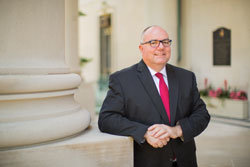Beginning in fall 2015, the communication department will be introducing its new five-year Bachelor of Arts and Master of Arts (BA/MA) program in communication/corporate and public communication (CPC).
Students will have to meet specified requirements to ensure eligibility into the BA/MA program. An incoming freshman must have achieved a minimum high school cumulative grade point average (GPA) of 3.25.
Additionally, an eligible applicant must have a combined SAT score equal to or greater than 1,600. Enrolled students are allowed to apply, however, they must complete between 48-90 credits and have a minimum GPA of 2.75.
Students open to accelerating the length of their masters education in communication will be interested in this program, according to Dr. Chad Dell, Chair of the Communication Department. The communication department is one of the few in the school of humanities that did not have an accelerated program until recently, whereas many departments already have BA/MS 5-year programs, including the Leon Hess Business School. The “slowness” of the foundation of the 5-year CPC program is in correlation with the workings of thesis papers, explained Dell.
With the riddance of thesis papers came the formation of the five-year program. “For students who elected to do a thesis or project as the culmination of their studies, there wasn’t enough time to complete the course works in one year. Our new non-thesis option makes this possible,” said Dell.
Angela Ramos, a sophomore communications and TV radio major, said, “I definitely think that the five-year program will be good for a lot of students. It’s cool. I like the concept of accelerated degrees. The department is moving forward. I think it would be great to get my masters in the same place that I got my bachelors. I would know my professors, and there would be a sense of familiarity.”
There are a number of benefits of enrollment in the program, according to Dell. If a student is accepted into their fifth year of graduate study then they are granted a $3,500 scholarship. The program is also risk-free, and students can withdraw at any time without the risk of penalty. Dell further explained that five-year CPC students will no longer be required to submit recommendation letters, GRE scores, and graduate application fees.
Dell believes that the greatest benefit to the five-year program is that students can earn graduate credits while simultaneously earning their undergraduate degree. “This is a terrific opportunity for both current and prospective students looking for a combined BA/MA program, and who want to complete them in five years. I’m very excited about this new option,” said Dell.
To apply, eligible students must talk with their advisors to discuss the requirements. When an enrolled five-year program student reaches their junior or senior year they must complete two graduate courses. For advancement into the 5th year students have to earn a B- or better in their undergraduate CPC classes. “As seniors, they apply for the CPC program. So long as they are maintaining their grades, they’re accepted. It’s pretty simple, actually,” said Dell.
Students may be more inclined to apply to the program for the shortened obtainment of their master’s degrees through five years of higher education, while others may have reasons for hesitation. “A big thing that might stop me from taking on a fifth year might be the financial aspect. Graduate school is even more expensive than undergrad, and there might be more loans involved,” said Ramos.
“Also I wouldn’t take it if the overall curriculum was very similar to that of my undergrad. I would want to be truly learning, even if it was just for one more year,” continued Ramos.
Furthermore, current upperclassmen tracked for graduation in four years may have gone beyond the maximum credit ceiling. Therefore, they are not eligible for admission into the 5-year program. “If I could go back to my freshmen year I would have definitely tried to get into the new 5-year program. It’s just one more year and you get a master’s degree. I am a senior and I wish I had one more year to take advantage of such an opportunity,” said Jessica Rossi, a senior TV radio major. “Even though I can’t apply for the program I still might go for my masters,” she continued.
Although Ross does not qualify for the five-year program but is interested in obtaining a graduate degree, she and similar upperclassmen are allotted alternative options.
“Our masters CPC program offers three exciting curricular tracks,” said Deanna Shoemaker, Director of the CPC Graduate Program. The department has a graduate degree for public relations and media, public service communication, and human resources management.
“The public relations and new media focus on crisis management, digital communication, fundraising, and audio/video/web production,” added Shoemaker.
“The Public Service Communication degree focuses on leadership, advocacy, ethics, and community relations. While the Human Resources Management degree focuses on organizational communication and culture, intercultural and diversity management, training and consulting, and conflict management,” she said.


